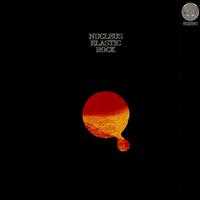Elastic Rock
From Wikipedia, the free encyclopedia
| Elastic Rock | ||||
|---|---|---|---|---|
 | ||||
| Studio album by Nucleus | ||||
| Released | March 1970 | |||
| Recorded | 12–21 January 1970 at Trident Studios, London | |||
| Genre | Jazz fusion | |||
| Length | 40:46 | |||
| Label |
Vertigo 2007 Remaster: Universal Records | |||
| Producer | Peter King | |||
| Nucleus chronology | ||||
| ||||
| Professional ratings | |
|---|---|
| Review scores | |
| Source | Rating |
| Allmusic | |
Elastic Rock is Nucleus' first album. Recorded in January 1970, it was a pioneering work in emerging genre of jazz-rock fusion. Bandleader Ian Carr (later a jazz journalist and published expert on Miles Davis) was probably inspired by Davis' "going electric" in 1969, but the seminal Bitches Brew had not yet been released at the time Elastic Rock was recorded, and according to Carr, they hadn't even heard Davis' less rock-influenced 1969 electric release, In a Silent Way.[2]
In July 1970 the group presented compositions from the LP at the Montreux Jazz Festival, winning the first prize. They subsequently performed both at Newport Jazz Festival and at the Village Gate jazz club.[2]
Track listing
All tracks composed by Karl Jenkins; except where indicated
- "1916" - 1:11
- "Elastic Rock" - 4:05
- "Striation" - 2:15 (Jeff Clyne, Chris Spedding)
- "Taranaki" - 1:39 (Brian Smith)
- "Twisted Track" - 5:17 (Chris Spedding)
- "Crude Blues, Part I" - 0:54 (Karl Jenkins, Ian Carr)
- "Crude Blues, Part II" - 2:36 (Ian Carr)
- "1916: The Battle of Boogaloo" - 3:07
- "Torrid Zone" - 8:41
- "Stonescape" - 2:39
- "Earth Mother" - 5:15 (Karl Jenkins, Ian Carr, John Marshall, Jeff Clyne, Chris Spedding)
- "Speaking for Myself, Personally, in My Own Opinion, I Think..." - 0:54 (John Marshall)
- "Persephones Jive" - 2:15 (Ian Carr)
Personnel
- Karl Jenkins – oboe, baritone saxophone, electric piano, piano
- Ian Carr – trumpet, flugelhorn
- Brian Smith – tenor saxophone, soprano saxophone, flute
- Jeff Clyne – bass, electric bass
- John Marshall – drums, percussion
- Chris Spedding – acoustic guitar, electric guitar
Notes
- ↑ Allmusic review
- ↑ 2.0 2.1 Kelman, John (2004-10-19). "Ian Carr and Nucleus: '70s British Jazz Rock Progenitors". All About Jazz.
External links
This article is issued from Wikipedia. The text is available under the Creative Commons Attribution/Share Alike; additional terms may apply for the media files.